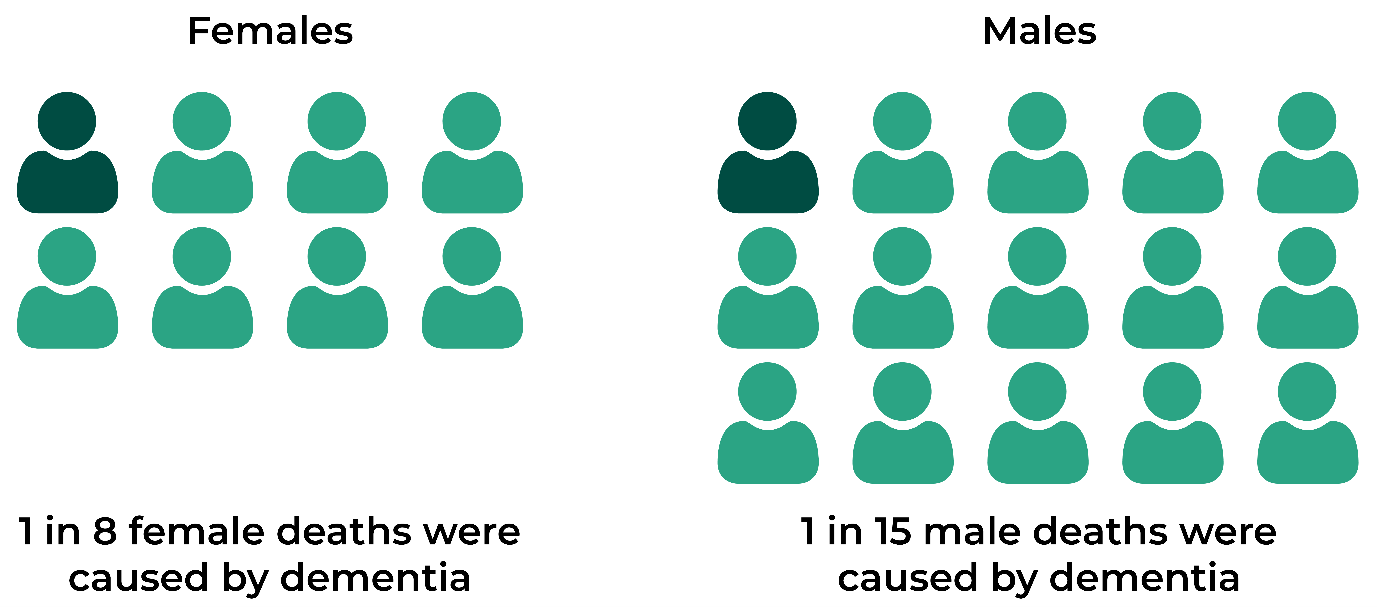Dementia is one of the leading causes of death across England and Wales. There were an estimated 46,800 older people (aged 65 and above) living with dementia in Wales in 2019.
This article looks at what action the Welsh Government has taken in relation to dementia care and support and what may need to be taken into account when planning for the future.
The impact of dementia
Prior to the pandemic, dementia was the leading cause of death across England and Wales.
The most recent figures show that dementia was responsible for 3,530 deaths in Wales in 2021, the third highest cause after COVID-19 and heart-disease. Dementia remains the leading cause of death for females in Wales, with almost twice as many women dying from dementia than men in 2021. However, the number of deaths due to dementia has been declining in Wales year-on-year since 2018.
Deaths caused by dementia in Wales, 2021

Source: Death registration summary statistics, England and Wales (2013-2021), Office of National Statistics.
The Deputy Minister for Social Services noted in May 2023 that the national census has confirmed that people are living longer, and that Wales is an ageing society. The census and other population projections suggest that we will see a very sizeable increase in those over 80 in the next few decades.
The biggest risk factor for dementia is ageing. As the proportion of the population who are aged 65 years and over increases, Wales’ ageing population may present a problem in terms of dementia care. By 2040, the number of older people living with dementia in Wales is projected to increase by 70%.
The number of older people with dementia is projected to increase by 70% by 2040

While dementia largely affects older people, it’s estimated over 42,000 people under the age of 65 in the UK are living with young-onset dementia.
What action is the Welsh Government taking?
The Deputy Minister for Mental Health and Wellbeing stated in April 2022 that she is determined to “continue our drive toward the transformational step change in dementia support that Welsh Government is fully committed to”.
The Welsh Government’s Dementia Action Plan 2018 to 2022 (published February 2018) sets out plans to improve diagnosis, care and support for people with dementia. The implementation of the action plan is supported by £9m made available to Regional Partnership Boards (RPBs) to ensure delivery is integrated across services and focuses on local needs.
A companion document to the action plan (published in September 2021) outlined the areas of focus following the COVID-19 pandemic, and the impact that has had on people living with dementia.
The Welsh Government has commissioned an independent evaluation into the Dementia Action Plan, and is continuing to assess the impact of the action plan on dementia care and support in Wales. The pandemic impacted on this work, which is expected to continue into 2023, and will inform the successor arrangements. The companion document acts as a ‘bridging plan’ whilst the priorities for the successor arrangements are identified.
An All Wales Dementia Care Pathway of Standards and All Wales Dementia Friendly Hospital Charter have been published. The Welsh Government also says it’s taking a “national and collaborative approach” to offering FDG-PET scanning, with the aim of increasing the effective and timely diagnosis of dementia.
Learning and development opportunities have been provided to those working in social care, health and family carers, and research and development also has a role in dementia care. Cardiff University is one of six universities leading research as part of the UK Dementia Institute.
Although the Welsh Government has been taking action in relation to dementia care and support, some issues have been raised relating to diagnosis and the availability of data.
Diagnosis of dementia
Early diagnosis of dementia is an important part of ensuring that people can get the support and services that they need and to plan ahead. Delays in diagnosis can increase pressures on already-stretched unpaid carers, and can mean that by the time a person does receive a diagnosis they need more substantial intervention, or to go into residential care.
Alzheimer’s Society Cymru provided information to the Senedd’s Health and Social Care Committee, during its inquiry on the impact of the waiting times backlog (report published April 2022). It stated that there is no concrete data on the increase in the numbers waiting for memory assessment services across Wales and it had heard “anecdotal evidence” that in late 2021 there were around 4,000 people waiting for a memory assessment service appointment in Wales.
Alzheimer’s Society Cymru also noted that in Wales, the diagnosis rate for dementia dropped to around 50% in the midst of pandemic. From the anecdotal evidence mentioned above, Wales was likely to add around 2,000 people to the estimated number of 50,000 people living with a diagnosis in Wales in January 2022.
The Welsh Government has acknowledged the increased pressure on memory assessment services. In addition to the £9m referenced above, a further £3m recurring investment was allocated to RPBs to support people during the assessment process and following diagnosis. In response to a recommendation by the Health and Social Care Committee, the Welsh Government stated in May 2022 that:
Improving timely diagnosis remains a priority for the Welsh Government and the new funding for diagnostic services will be monitored by officials to ensure that we are able to see the impact of this funding in timely access to services.
What data is there on people living with dementia?
Different figures can be used to estimate the number of people living with dementia in Wales. This article uses figures from a report commissioned by the Alzheimer’s Society and published 2019.
The Welsh Government has noted that “timely and accurate dementia diagnosis and recording is crucial to provision of the right care and support”. However, Alzheimer’s Society Cymru said in March 2022 that data on dementia in Wales is “incredibly bad” and “something we need to improve dramatically”. The need for quality, long-term data on dementia has also been raised in Plenary, along with the call for the Welsh Government to establish a National Dementia Data Observatory to improve the planning and delivery of dementia services.
While the Welsh Government says calls for a National Dementia Data Observatory are “entirely in line” with its current policy intent, it believes the same outcomes can be achieved by developing data standards and strengthening its links with academia. The Deputy Minister for Mental Health and Wellbeing stated that the data it establishes on dementia assessment and support will be reported nationally and will be exposed to the same level of scrutiny as other NHS quality and performance data.
Planning ahead
The Welsh Government has taken action in relation to care and support for those living with dementia. However, the conclusions of the evaluation of the Dementia Action Plan will identify whether there is evidence that the Plan has made improvements to dementia services.
With an ageing population and the projected increase in those with dementia, improvements to timely diagnosis and availability of sufficient data will be important factors in planning the provision of future care and support. It will also be important that the progress of the Welsh Government in providing dementia services can be monitored.
Article by Rebekah James, Senedd Research, Welsh Parliament






